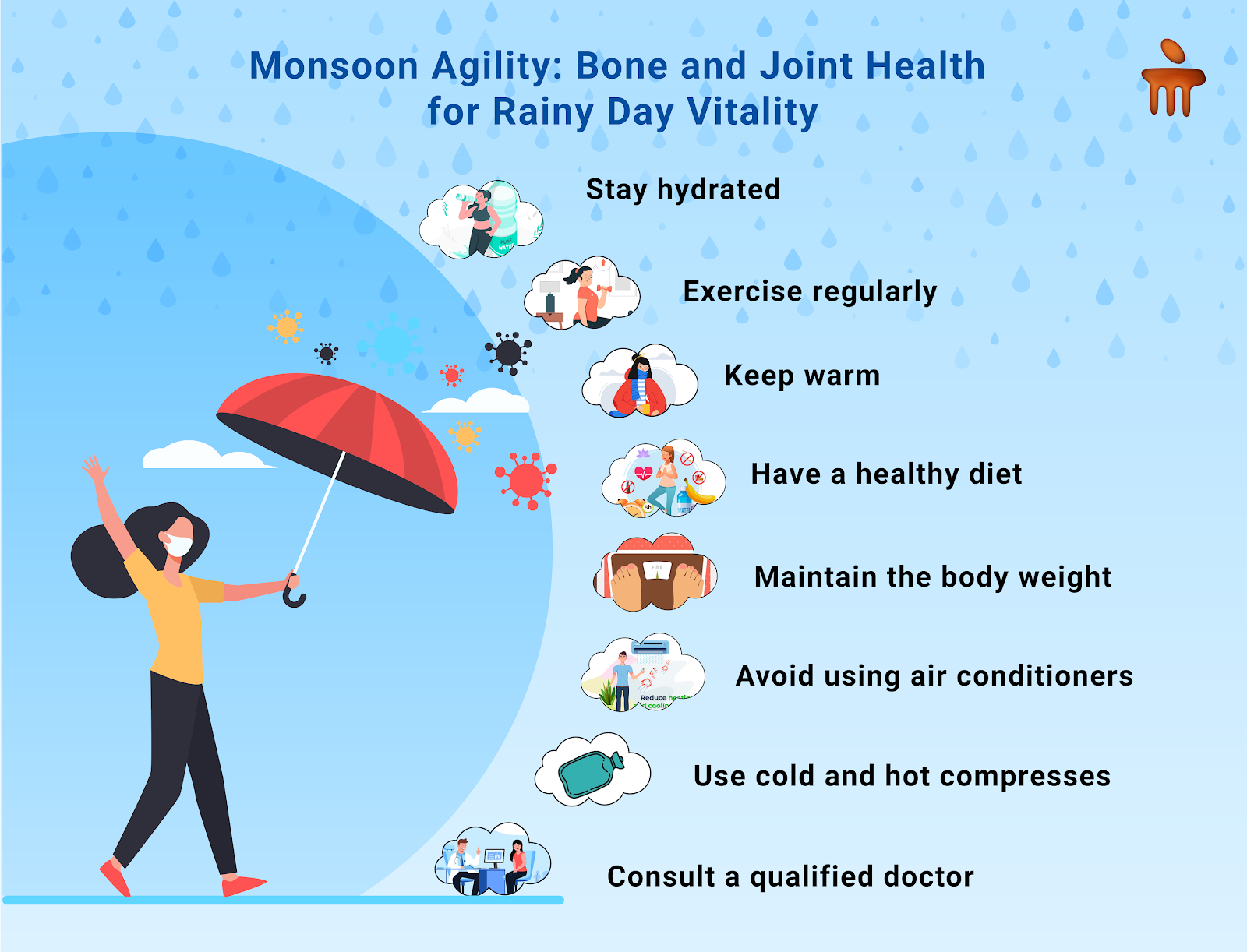
Have you ever noticed that your bones hurt more on rainy days, making it difficult to carry out your everyday tasks? While the monsoon is often beautiful, it may quickly turn into a nightmare. There is a link between seasonal changes and bone and joint pain. Cold weather can be difficult on bone and joint health. Due to the quick change in temperature, precipitation, and variations in air pressure, many people begin to experience joint discomfort, muscular stiffness, and injury pain as soon as the monsoon season starts. This is because high humidity levels make it difficult for the body to pump blood since they might thicken the blood and increase blood pressure in blood vessels.
Dehydration, which reduces the concentration of fluid surrounding the joints and makes the pain worse, can also result from humid days. And to top it all off, these things can make arthritis pain worse and reduce range of motion. An additional factor might be nutritional inadequacies. Joint pain and stiffness, as well as anxiety, are common complaints among people, especially those over 60. Therefore, managing the pain is crucial rather than ignoring it. Visit the best orthopedic hospital in Kolkata to get tested for bone health.
Rain can cause discomfort for some individuals. People may have inflammation of one or more joints, resulting in pain and stiffness due to changes in humidity levels, atmospheric pressure, shifts in temperature, and precipitation. Here are a few simple but efficient strategies for relieving bone and joint pain brought on by monsoon season and How to Maintain Bone Health:

-
Staying Hydrated
Since we do not frequently feel thirsty during the rainy season, most people frequently forget to drink enough water. Dehydration becomes more likely as a result. When someone is dehydrated, their pain sensitivity increases. So, during the monsoon, individuals should be sure to drink enough water every day.
-
Exercising Regularly
Being fit and healthy requires keeping oneself active by doing some exercise activities every day. It prevents various health issues, such as bone and joint pain. Exercises that put less strain on the bones and joints might help the muscles and joints when they become tight and painful. It also helps with getting relief from joint pain. Therefore, it is recommended to incorporate exercises such as Pilates, yoga, swimming, brisk walking, and many other activities into the schedule. After performing warm-ups or stretches, individuals should be sure to start their activities slowly. They should try to limit the amount of time spent sitting down. Consult the best orthopaedist in Kolkata in case of any discomfort or constant joint pain.
-
Keeping Oneself Warm
Making an effort to keep the body warm when it gets colder during the monsoon is recommended to prevent the worsening of bone and joint pain. Individuals are recommended to use a blanket at night, take a warm shower, put on warm gloves and stockings, wear full sleeves, or dress in layers. Individuals can also try increasing the temperature in their houses. It enhances blood circulation and lessens stiffness, oedema, and discomfort.
-
Having a Healthy Diet
Individuals can live a healthy, pain-free life by eating a nourishing, balanced diet. It is recommended to include anti-inflammatory items in the diet to help lessen joint discomfort and inflammation. A difference, for instance, can be made by vitamin E-rich diets. Increasing the number of nuts, avocados, seeds, fish, berries, fruits, and whole grains in the diet every day is recommended. The intake of eggs and herbs is also recommended.
-
Maintaining Body Weight
Being overweight or obese can make bone and joint pain worse during the monsoon. So individuals should make an effort to lose weight. It is preferred to stay indoors when it rains frequently outside, which keeps people from engaging in physical activities like walking. People gain weight as a result, and their discomfort levels grow. Extra body weight puts more strain on the joint while increasing the pain. One can maintain a healthy body weight with regular exercise and an appropriate diet. It is advised to include foods that are high in vitamins and omega-3 fatty acids in the diet.
-
Avoiding the use of Air Conditioners
During the monsoon, using air conditioning indoors can make joint pain worse. So, if someone has joint discomfort or bone health issues, they should not turn on the air conditioner, as it can make them worse.
-
Consulting a Qualified Doctor
If none of these pain-relieving techniques or treatments work for the individual or if their bone and joint discomfort persists over time, they should see an orthopaedic physician. Chronic or persistent pain may indicate a dangerous underlying problem. The expert doctor can promptly diagnose the issue, provide them with the appropriate care, and foresee any related health risks. Also, read the blog 10 Symptoms when you should consult an orthopaedic doctor to get detailed knowledge.





















 5 Min Read
5 Min Read




















